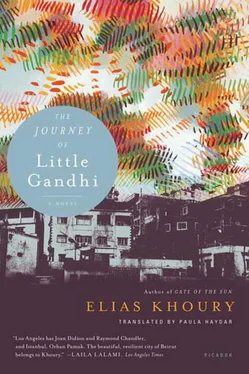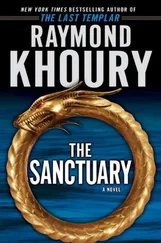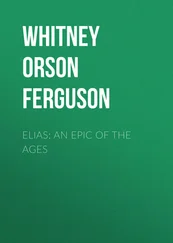“You’re right,” Vitsky would say, yawning. She’d say in broken Arabic she’d had it and was going to bed. Vitsky would speak Arabic when she wanted to express dissatisfaction, as if this language was good only for swearing and expressing dissatisfaction.
Madame Sabbagha would go on knitting the blue sweater she would never send to her grandson, because her daughter never got married and didn’t live in France. Her daughter, whom she never visited, was in the sanitarium in Dayr al-Salib. She told everyone she sent her to France and she got married there. She said she was knitting for her grandson little George.
Vitsky wanted to go, but Madame Sabbagha tried to make her stay and listen to her stories about the past glories of her family, now extinct.
“It’s unbelievable. They all died. I’m the only one left. I’m like you, Vitsky. I’m all alone. I have no one.”
“No, not you. Me, yes. You know who I am.”
“Of course I know. But they’re all dead. One was a lawyer, one was a journalist, and one was a poet. Three brothers. The first got married but didn’t have any children. The second never married, he just kept on chasing after barmaids. The third died a young man, eighteen years old. His name was Shukri. He was really something, as beautiful as a full moon on a clear day. He died of typhus at eighteen, and only I remained. And I, too, had only a daughter. They married me off to my cousin in order to keep the money in the family. As you know, he was, God rest his soul, a bit simpleminded. He spent his time selling the land we inherited, and then he laid down his head and died. They all died, leaving no male descendants to carry on the family name. Shukri drove the Jesuits crazy. Once the class was supposed to write a poem, and so Shukri wrote twenty poems for the whole class, using twenty different meters and twenty different rhyme schemes. His poem was the best; it drove the Jesuit priests crazy. ‘Don’t trust a Jesuit priest / who dons a demon’s habit / And saunters in it like a he-goat in his lair’ or his hair or his I don’t know what. Poor me. I was the only one who didn’t have a good memory. To hell with memory; it eats you alive and makes a laughingstock out of you.”
She’d repeat the same stories every evening. How Wadia the maid died and was transferred to her distant village in Akkar. Curses against the war and those fighting in it. Stories about the hairdresser, and Madame Nuha Aoun, who was killed. All this with Vitsky at her side, like her own sister.
Simaan Fayyad told Vitsky that Madame Sabbagha would be like a sister to her. He told her he’d rescue her from the mess with the bishop and take her to work in Ras Beirut at the Sabbagha residence, and the madame will be like more than a sister to you.
After that Simaan Fayyad disappeared.
Vitsky spoke about him once in front of Madame Sabbagha. She said he was a gentleman, and very sweet, and so Madame Sabbagha broke into laughter.
“He’s an idiot, my friend. I hope you didn’t fall in love with him.”
Vitsky shuddered at talk about love. She never loved anyone. Her whole life she remained faithful to the Russian officer whom she searched for everywhere. For twenty years or so she’d go to the Red Cross in Beirut and inquire about him. Then she stopped going because the official there started treating her as if she were crazy. Vitsky was never in love with that nitwit Simaan Fayyad. All she said was that he was cute.
Simaan Fayyad really was a nitwit. Everyone treated him like one and he couldn’t do anything right. He wasted his father’s fortune with the stroke of a pen after one of his uncles convinced him to take him as his partner in the silk business. The business evaporated and along with it the fortune. Simaan Fayyad then became a sexton in Saint George’s Cathedral in the middle of town and put in time every evening at the diocese doing nothing.
It was Simaan Fayyad who told Vitsky that Russia was the salt of the earth. He told her the story of his grandfather. Prince Alexander, the czar’s brother, visited Beirut in 1896 and roamed around in the Sursuq Quarter, where his grandfather Fayyad Fayyad lived and worked as a silk merchant.
He told about how the czar’s brother rode around Beirut in a carriage drawn by six Arabian horses. When he got to the Sursuq Quarter he saw a strange thing. There was a mound of salt on the side of the road roughly five meters long and two meters wide. Hundreds of lighted candles had been placed on top of it. And Mr. Fayyad Fayyad stood there next to it wearing his red fez and his white silk gown with the striped belt. He stood in front of the candles, waiting, as though he were guarding them.
The czar’s brother stopped the carriage, which was being pulled by six pure-bred Arabian horses, got out, and saw Fayyad.
“What is this?” asked the blond Russian prince with the gleaming blue eyes.
Fayyad Fayyad bowed down so low his tarboosh nearly touched the ground and said, “This is for His Highness the Prince.”
He asked the interpreter accompanying him what it meant.
Fayyad stood up straight and said, “Salt. Salt means Russia is the salt of the earth.”
The interpreter translated Fayyad’s words into Russian. The czar’s brother approved with a big smile that made his whole face shine.
“And the candles?” the prince asked.
“The candles, Your Majesty, the candles symbolize Russia as the light of the world,” Fayyad said without waiting for the interpreter to translate the prince’s question into Arabic.
After the interpreter translated Fayyad’s answer into Russian the prince approached this Lebanese man, placed his hand on his head, and said, “Demand whatever you want, I speak on behalf of the czar of Russia. The czar of all Russia takes you under his protection, and is ready to grant all your requests. Demand whatever you want. All your wishes will be granted.”
Fayyad Fayyad listened to the prince’s words through the voice of the interpreter, his eyes watching the prince and not believing what they saw.
The old man with the wrinkled face couldn’t decide what to ask for, and so he stood there silently, as though he hadn’t heard the Russian prince’s words.
“Say something, Uncle,” the interpreter said.
Fayyad Fayyad said he had one request.
“What is your request?” the interpreter asked, as though he were trying to get Fayyad to hurry up and say something.
“My request, my son, tell His Highness, tell him, I don’t want them to tell me ‘Throw the rope down, Fayyad’ anymore.”
“What do you mean?” the interpreter said.
“You tell him that every evening, this guy who lights up the streets comes. I’d be sitting in my house on the first floor and he comes and says, ‘Throw the rope down, Fayyad’ and I throw it down. I fill the lantern with oil, raise it back up with the rope, hang it up, and light it. I don’t want anyone to tell me, ‘Throw the rope down, Fayyad’ anymore.”
Fayyad Fayyad didn’t know what the interpreter translated to the czar’s brother. All he saw was the prince’s smile beaming on his face. His face twinkled like an icon. The czar’s brother got in his carriage drawn by six pure-bred Arabian horses and left Fayyad and his candles lighted all night long.
Vitsky asked if Fayyad stopped letting down the lantern, and Fayyad the grandson answered, “I don’t know. The Turks left and then came the French, and under the French everything changed. The Jesuits took over everything and we no longer knew in which country we were living. One minute the state of Beirut, the next Greater Lebanon, the next Syria, and the next I don’t know what. The French are like priests; no one understands them.”
Simaan Fayyad was trying to explain to the Russian princess that the French mandate was the cause of all the problems. But she didn’t quite understand his position, for he loved France and loved to sleep.
Читать дальше












